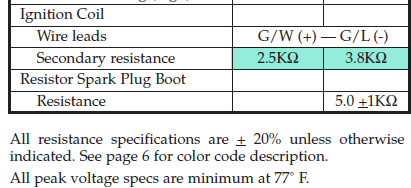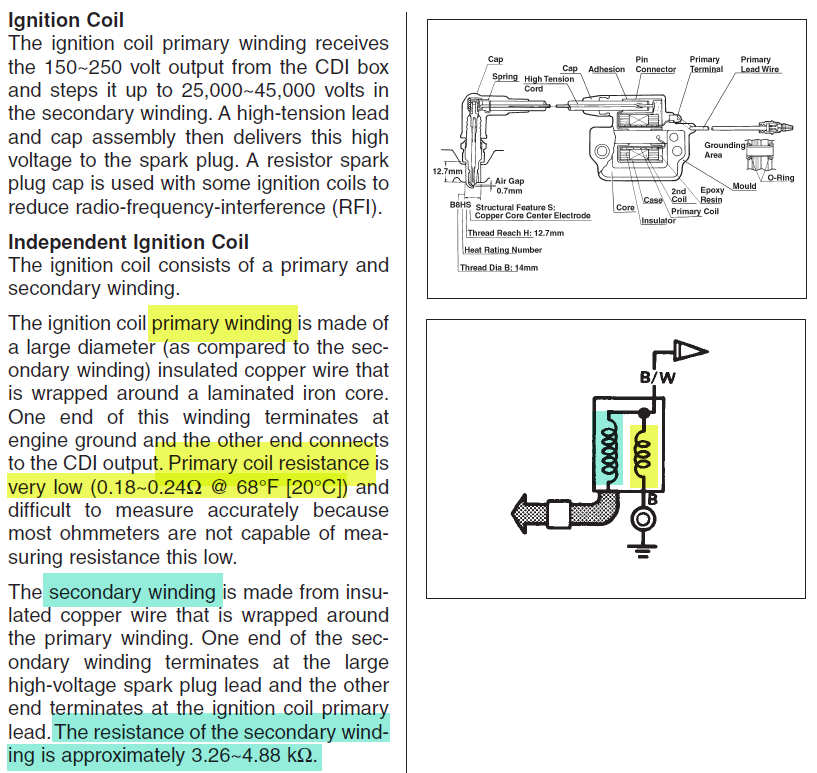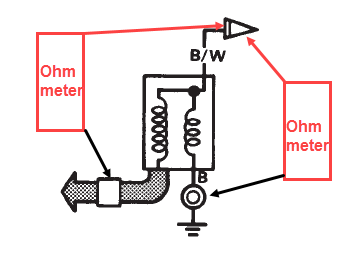Could any of you experts point me to a detailed description of how to test the ignition coils on my 2002 150txra? I do have the shop manual and have found various other tests but not the ignition coils. I am not experienced at working on outboards but am usually able to follow instructions if i have them. I did also try searching these forums. I'd appreciate any help.
Announcement
Collapse
No announcement yet.
2002 150txra Ignition Coil Test
Collapse
X
-
Originally posted by boscoe99 View Post
Yes I believe so. I'm having trouble finding the specs. I would like to verify that the ignition coils are not faulty.
Comment
-
The problem with resistance testing is that very low voltage is used. This does not reflect what voltages are present when the coil is in actual operation.Originally posted by boscoe99 View PostOnly thing that I can find re testing the ignition coil.

The most accurate tester would be where input voltage pulses are equivalent to “normal” operating revolutions and the secondary is connected to a real spark plug. But the difficulty is the spark plug also needs to be in an operational environment, and that is most importantly under pressure.
Why? because high voltages can arch across windings, or breach insulation.
Most difficult to diagnose a coil without this setup. This is an area where throwing parts at the problem really works, by changing the coil for a new one to see if the symptoms go away.Last edited by zenoahphobic; 02-23-2021, 06:43 PM.
Comment
-
That could be the basis for a bench top tester. You could add circuitry to make that happen frequently to see how the coil “recovers”.Originally posted by boscoe99 View PostJust get a 150 volt capacitor. Charge it via a wall socket through a diode. Discharge it into the coil. The plug should spark.
I’ve seen such that have made a spark plug spark, but the coil wouldn’t operate properly in the engine.
One can also fashion a chamber out of thick Perspex, screw in a spark plug and a pressure inlet port. Pump it to a couple of thousand psi and watch spark. Problem is do you trust threads in Perspex at that pressure, so it becomes a much more complex piece of equipment. Every motor mechanic should have one though.
Comment
-
why would you need to pump it up that high?Originally posted by zenoahphobic View Post
That could be the basis for a bench top tester. You could add circuitry to make that happen frequently to see how the coil “recovers”.
I’ve seen such that have made a spark plug spark, but the coil wouldn’t operate properly in the engine.
One can also fashion a chamber out of thick Perspex, screw in a spark plug and a pressure inlet port. Pump it to a couple of thousand psi and watch spark. Problem is do you trust threads in Perspex at that pressure, so it becomes a much more complex piece of equipment. Every motor mechanic should have one though.
cylinder compression is not that high when spark is ignited.
back in the 70s we had spark plug testers and just used shop air, so way less that 200
Comment




Comment